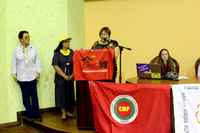Defence of land and right to the city: for a new global agenda for inhabitants
1. A quick tour of cities shows us that today there are serious shared problems that affect the majority of the population. Examples of some of these problems are: the current neoliberal urbanisation model, which is market driven and does not take into account needs and quality of life, nor the minimum planning requirements; the development of large-scale infrastructure investments by states, with a view to creating favourable conditions for major private investment, which causes the eradication of populations, the division of territories and the fragmentation of the city; the unlimited growth of the real estate market, which allocates the best land to high-earning sectors of society, privatises public spaces and builds houses that remain empty.
2. This reality is accompanied by an increase in material poverty in absolute terms in the majority of countries, as well as widening of the inequality gap[1] . This gives rise to a renewed process of spatial segregation affecting populations with fewer resources, who find themselves forced to abandon their location and occupy places that are inadequate for living, in a situation of extreme vulnerability.
3. The city, on the other hand, has invaded the countryside. The borders between the urban world and the rural world have become blurred and the growing land conflict between those who use all their power to take over land and those who resist this expropriation and fight to safeguard their rights is brought to light. The main victims of these practices are indigenous people and populations affected by mega projects and mining activities.
4. Current climate change – a product of the existing development model – brings weather events that affect the entire planet, with serious consequences for nature, livings creatures and the population in general, particularly for the poorest.
5. Money laundering and drug trafficking have become factors that must be taken into account in the development of our cities. They taint them with crime and violence, taking advantage of the helplessness of the young.
6. The idea of the city as a commodity, with little regard for human beings, is accompanied by the weakening of local governments as bodies governing urban development and by the prevalence of the false idea of competitive nationality, which facilitates private investment. According to this, discourse on sustainable cities is not practically feasible.
To be resolved:
1. The current urbanisation model can only be understood within the current exclusive and predatory development model. We must broaden and coordinate our fights for the defence of territories, resisting the attack of neoliberalism, against evictions and dispossessions, claiming the right to the city and defending its ruralisation.
2. Unite all struggles for the defence of territory with campesino movements, anti-climate change movements, anti-mining movements, movements against mega-projects and movements for the defence of indigenous people, in a new global agenda for inhabitants, which will involve all international networks and be a landmark in the World Assembly of Inhabitants.
3. Institutionalise the International Tribunal against Evictions as an instrument to defend the right to land against the dispossessions that inhabitants are victims of.
Quito, October 2016
[1] GINI studies eg https://data.worldbank.org/indicator/SI.POV.GINI


